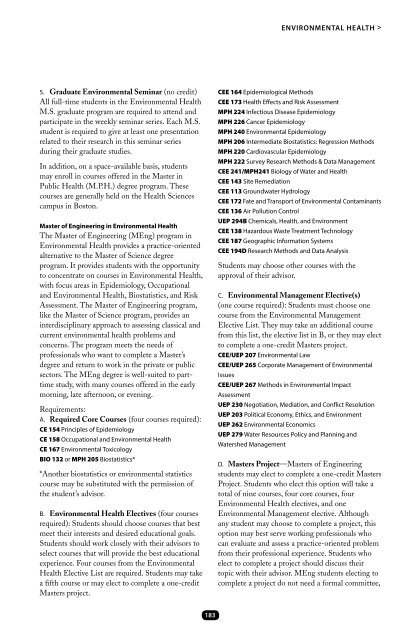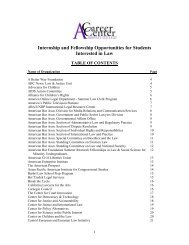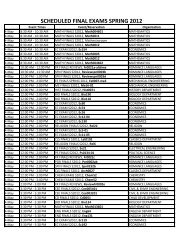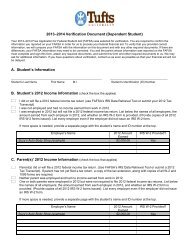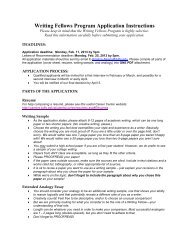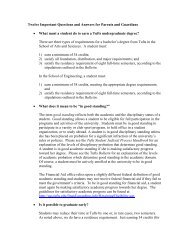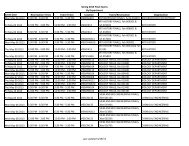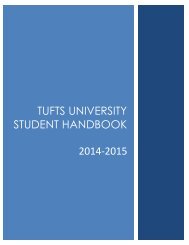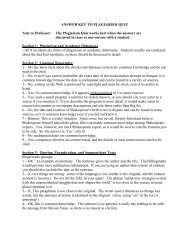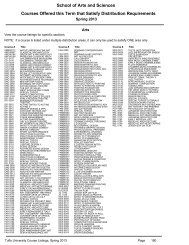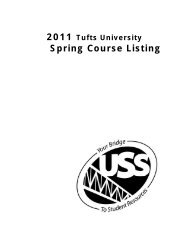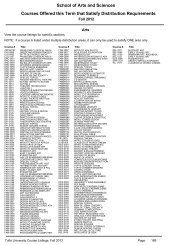2013â2014 The Bulletin - USS at Tufts - Tufts University
2013â2014 The Bulletin - USS at Tufts - Tufts University
2013â2014 The Bulletin - USS at Tufts - Tufts University
You also want an ePaper? Increase the reach of your titles
YUMPU automatically turns print PDFs into web optimized ePapers that Google loves.
Environmental Health ><br />
5. Gradu<strong>at</strong>e Environmental Seminar (no credit)<br />
All full-time students in the Environmental Health<br />
M.S. gradu<strong>at</strong>e program are required to <strong>at</strong>tend and<br />
particip<strong>at</strong>e in the weekly seminar series. Each M.S.<br />
student is required to give <strong>at</strong> least one present<strong>at</strong>ion<br />
rel<strong>at</strong>ed to their research in this seminar series<br />
during their gradu<strong>at</strong>e studies.<br />
In addition, on a space-available basis, students<br />
may enroll in courses offered in the Master in<br />
Public Health (M.P.H.) degree program. <strong>The</strong>se<br />
courses are generally held on the Health Sciences<br />
campus in Boston.<br />
Master of Engineering in Environmental Health<br />
<strong>The</strong> Master of Engineering (MEng) program in<br />
Environmental Health provides a practice-oriented<br />
altern<strong>at</strong>ive to the Master of Science degree<br />
program. It provides students with the opportunity<br />
to concentr<strong>at</strong>e on courses in Environmental Health,<br />
with focus areas in Epidemiology, Occup<strong>at</strong>ional<br />
and Environmental Health, Biost<strong>at</strong>istics, and Risk<br />
Assessment. <strong>The</strong> Master of Engineering program,<br />
like the Master of Science program, provides an<br />
interdisciplinary approach to assessing classical and<br />
current environmental health problems and<br />
concerns. <strong>The</strong> program meets the needs of<br />
professionals who want to complete a Master’s<br />
degree and return to work in the priv<strong>at</strong>e or public<br />
sectors. <strong>The</strong> MEng degree is well-suited to parttime<br />
study, with many courses offered in the early<br />
morning, l<strong>at</strong>e afternoon, or evening.<br />
Requirements:<br />
A. Required Core Courses (four courses required):<br />
CE 154 Principles of Epidemiology<br />
CE 158 Occup<strong>at</strong>ional and Environmental Health<br />
CE 167 Environmental Toxicology<br />
BIO 132 or MPH 205 Biost<strong>at</strong>istics*<br />
*Another biost<strong>at</strong>istics or environmental st<strong>at</strong>istics<br />
course may be substituted with the permission of<br />
the student’s advisor.<br />
B. Environmental Health Electives (four courses<br />
required): Students should choose courses th<strong>at</strong> best<br />
meet their interests and desired educ<strong>at</strong>ional goals.<br />
Students should work closely with their advisors to<br />
select courses th<strong>at</strong> will provide the best educ<strong>at</strong>ional<br />
experience. Four courses from the Environmental<br />
Health Elective List are required. Students may take<br />
a fifth course or may elect to complete a one-credit<br />
Masters project.<br />
CEE 164 Epidemiological Methods<br />
CEE 173 Health Effects and Risk Assessment<br />
MPH 224 Infectious Disease Epidemiology<br />
MPH 226 Cancer Epidemiology<br />
MPH 240 Environmental Epidemiology<br />
MPH 206 Intermedi<strong>at</strong>e Biost<strong>at</strong>istics: Regression Methods<br />
MPH 220 Cardiovascular Epidemiology<br />
MPH 222 Survey Research Methods & D<strong>at</strong>a Management<br />
CEE 241/MPH241 Biology of W<strong>at</strong>er and Health<br />
CEE 143 Site Remedi<strong>at</strong>ion<br />
CEE 113 Groundw<strong>at</strong>er Hydrology<br />
CEE 172 F<strong>at</strong>e and Transport of Environmental Contaminants<br />
CEE 136 Air Pollution Control<br />
UEP 294B Chemicals, Health, and Environment<br />
CEE 138 Hazardous Waste Tre<strong>at</strong>ment Technology<br />
CEE 187 Geographic Inform<strong>at</strong>ion Systems<br />
CEE 194D Research Methods and D<strong>at</strong>a Analysis<br />
Students may choose other courses with the<br />
approval of their advisor.<br />
C. Environmental Management Elective(s)<br />
(one course required): Students must choose one<br />
course from the Environmental Management<br />
Elective List. <strong>The</strong>y may take an additional course<br />
from this list, the elective list in B, or they may elect<br />
to complete a one-credit Masters project.<br />
CEE/UEP 207 Environmental Law<br />
CEE/UEP 265 Corpor<strong>at</strong>e Management of Environmental<br />
Issues<br />
CEE/UEP 267 Methods in Environmental Impact<br />
Assessment<br />
UEP 230 Negoti<strong>at</strong>ion, Medi<strong>at</strong>ion, and Conflict Resolution<br />
UEP 203 Political Economy, Ethics, and Environment<br />
UEP 262 Environmental Economics<br />
UEP 279 W<strong>at</strong>er Resources Policy and Planning and<br />
W<strong>at</strong>ershed Management<br />
D. Masters Project—Masters of Engineering<br />
students may elect to complete a one-credit Masters<br />
Project. Students who elect this option will take a<br />
total of nine courses, four core courses, four<br />
Environmental Health electives, and one<br />
Environmental Management elective. Although<br />
any student may choose to complete a project, this<br />
option may best serve working professionals who<br />
can evalu<strong>at</strong>e and assess a practice-oriented problem<br />
from their professional experience. Students who<br />
elect to complete a project should discuss their<br />
topic with their advisor. MEng students electing to<br />
complete a project do not need a formal committee,<br />
183


